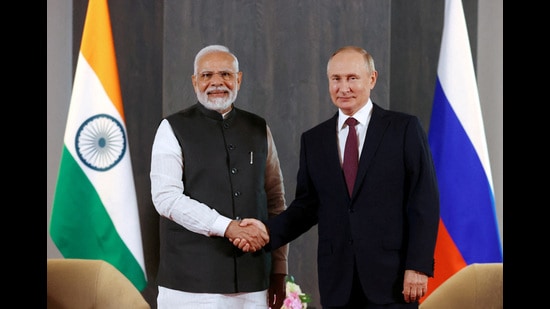Jul 05, 2024 09:07 PM IST
If India is to become a pole of consequence in a multipolar world in the making, it has to go beyond having clear stands and play a clear political role in regional conflicts and global security issues
With Prime Minister (PM) Narendra Modi set to leave for Russia on Monday — the first official bilateral visit abroad in his third term — Non-Alignment has made a return, no matter what one calls it. The world is now well and truly polarised, with one side backing the so-called rules-based international order, liberal democracy, and western values, and the other, whose contours emerged in February 2022 with the “no-limits partnership” between Russia and China, promising development, growth and no-questions-asked partnerships. Two different agendas and two differing world views in 2024, this is an echo of what was when India became independent in 1947. What has changed since then is that the two poles are now more interlinked than ever, and the world faces unprecedented challenges that call for close collaboration, not chronic hostility. But the two sides continue to see each other as dangerous adversaries and are trying their best to weaken the other and expand their spheres of influence, even at the cost of destabilising global peace and security. In this scenario, which harks back to the Cold War, the rest of the world has been asked to take sides.

The choice to join or not join with either side is always a political one, whether in 2024 or 1947. Then, it was “to keep away from the power politics of groups, aligned against one another, which have led to World Wars and which may again lead to disasters on an even vaster scale.” Now, it is the Ukraine war and the Gaza war. The Ukraine war set India on the path to Non-Alignment 2.0. The country’s abstention during voting on the issue in the UN Security Council (UNSC) steeled the spines of many other influential developing countries that were unsure of the position to take. Any hesitation we may have had was finally shed when India refused to comply with the unilateral sanctions by the West, led by the United States (US), on Russia, especially on oil imports.
Earlier, a heavily oil import-dependent India (importing 85% of its requirements) could be bullied — the exemption to India for oil imports from Iran was revoked, pushing it to reduce this from 11% to 0%. It was a very difficult transition for India, and finding alternative sources proved quite challenging. Then came the sanctions on Venezuela, even as India was the third-largest importer of Venezuelan crude. This fell to zero as well. When India was told to cut oil imports from Russia, we said enough is enough. We increased our oil imports from Russia to an unprecedented 40% of our total requirement — Non-Alignment 2.0 in full public glare.
However, if India wants to leverage its position for leadership, which it must to become a genuine pole in a multipolar world in the making, we need to play a more assertive political role on both regional conflicts and global peace/security issues.
As the fifth largest economy (aspiring to become the third by 2030) with an independent foreign policy — enjoying the best of bilateral relations with a diverse set of countries — India has many things going for it. Development partnerships and Covid Maitri reinforced our standing in the Global South. But, by themselves, these are not adequate for India to become a pole in world affairs. We need to play a bigger political role in conflict situations.
Our excellent bilateral relations with individual countries and our global role as a provider of assistance are not substitutes for a robust policy towards conflicts. Regional strategy is not a sum of its bilateral parts since regional dynamics are usually different from bilateral dynamics. The differences and alignments between countries in a region play out differently and have to be factored into fashion a separate policy of engagement in conflicts and issues of peace and security. India is no stranger to this, having played such crucial political roles in many conflicts, including the Korean War in the early 1950s when we were in the UNSC (1950-51), barely three years after Independence.
In recognition of its ceaseless efforts to finalise the armistice agreement in 1953, India was made Chair of the five-member Neutral Nations Repatriation Commission. Again, during our recent stint in UNSC (2021-22), India played a decisive role on numerous occasions in bridging the divide between the five permanent members, i.e., between P-3 (the United States, the United Kingdom, and France) and P-2 (China and Russia) on peace and security issues.
Our stand on Ukraine and West Asia reinforces this point. We have the best of relations with the countries involved, even if they oppose each other. India has also articulated a clear-cut, balanced stand on both these wars. But we have hesitated to move beyond and engage the region at a political level to change from being a bystander to an active player.
While there may be good reasons for us not to get involved and only take care of our own interests, it should not prevent us from putting in place an active regional strategy even while we engage the two sides actively. We have seen how Turkiye, for all its economic, financial and social woes, successfully leveraged its position, both geographically straddling Europe and Asia and politically as an Islamic NATO member, to become the “go-to” country for many regional and other conflicts.
For India, leadership lies in going beyond taking a stand and playing a clear political role. If not, someone else, not necessarily friendly to us, will fill that space. The PM’s visit to Russia provides us with just that opportunity.
TS Tirumurti is a former Permanent Representative of India to the United Nations.The views expressed are personal
Story Saved


